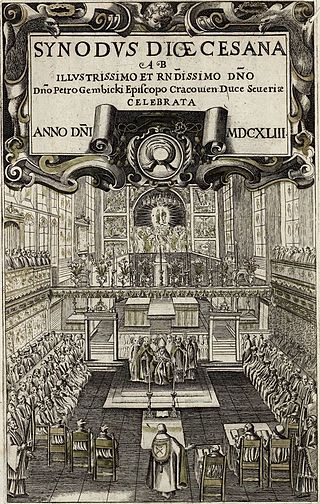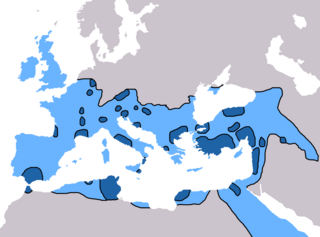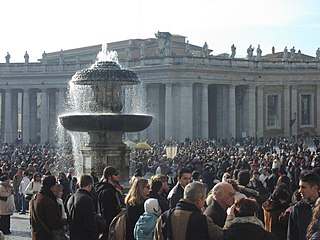An ecumenical council, also called general council, is a meeting of bishops and other church authorities to consider and rule on questions of Christian doctrine, administration, discipline, and other matters in which those entitled to vote are convoked from the whole world (oikoumene) and which secures the approbation of the whole Church.

The Eastern Orthodox Church, officially the Orthodox Catholic Church, and also called the Greek Orthodox Church or simply the Orthodox Church, is the second-largest Christian church, with approximately 230 million baptised members. It operates as a communion of autocephalous churches, each governed by its bishops via local synods. The church has no central doctrinal or governmental authority analogous to the pope of the Catholic Church. Nevertheless, the Ecumenical Patriarch of Constantinople is recognised by them as primus inter pares, a title formerly given to the patriarch of Rome. As one of the oldest surviving religious institutions in the world, the Eastern Orthodox Church has played an especially prominent role in the history and culture of Eastern and Southeastern Europe.

The politics of Saudi Arabia takes place in the context of a unitary absolute monarchy, along traditional Islamist lines, where the King is both the head of state and government. Decisions are, to a large extent, made on the basis of consultation among the King, the Council of Ministers, Islamic scholars, tribal leaders, and other traditional elites of the society. Saudi government is authoritarian, although some analysts have characterized the government of Mohammed bin Salman as totalitarian. The Crown Prince and Prime Minister of Saudi Arabia, Mohammed bin Salman, is the de facto ruler of Saudi Arabia. Under his rule, he has centralized policymaking, purged competing political elites, and dismantled pre-existing power-sharing dynamics.
Monophysitism or monophysism is a Christological doctrine that states that there was only one nature—the divine—in the person of Jesus Christ, who was the incarnated Word. It is rejected as heretical by the Catholic Church, Eastern Orthodox Church, Anglicanism, Lutheranism and all mainstream Protestant denominations, which hold to the dyophysitism of the 451 Council of Chalcedon- as well by Oriental Orthodoxy, which holds to miaphysitism.

A synod is a council of a Christian denomination, usually convened to decide an issue of doctrine, administration or application. The word synod comes from the Ancient Greek σύνοδος 'assembly, meeting'; the term is analogous with the Latin word concilium'council'. Originally, synods were meetings of bishops, and the word is still used in that sense in Catholicism, Oriental Orthodoxy and Eastern Orthodoxy. In modern usage, the word often refers to the governing body of a particular church, whether its members are meeting or not. It is also sometimes used to refer to a church that is governed by a synod.
David of Dinant was a pantheistic philosopher. He may have been a member of, or at least been influenced by, a pantheistic sect known as the Amalricians. David was condemned by the Church in 1210 for his writing of the "Quaternuli", which forced him to flee Paris. When and where he died is unknown; all that can be ascertained is that he died after the year 1215, as he was condemned again in the council of 1215.

The Quinisext Council, i.e., the Fifth-Sixth Council, often called the Council in Trullo, Trullan Council, or the Penthekte Synod, was a church council held in 692 at Constantinople under Justinian II.
College of Bishops, also known as the Ordo of Bishops, is a term used in the Catholic Church to denote the collection of those bishops who are in communion with the Pope. Under Canon Law, a college is a collection of persons united together for a common object so as to form one body. The Bishop of Rome is the head of the college.
A vestry was a committee for the local secular and ecclesiastical government of a parish in England, Wales and some English colonies, which originally met in the vestry or sacristy of the parish church, and consequently became known colloquially as the "vestry". At their height, the vestries were the only form of local government in many places and spent nearly one-fifth of the budget of the British government. They were stripped of their secular functions in 1894 and were abolished in 1921.
The Arabici were a small Christian sect of the 3rd century. The name of their founder is lost to history. Augustine of Hippo labelled them "Arabici" in the belief that this sect flourished in Arabia. Other sources referred to them occasionally as Thnetopcychitae or Thanatopsychitae.
The Second Council of Ephesus was a Christological church synod in 449 convened by Emperor Theodosius II under the presidency of Pope Dioscorus I of Alexandria. It was intended to be an ecumenical council, and it is accepted as such by the miaphysite churches but was rejected by Chalcedonian Christians. It was explicitly repudiated by the next council, the Council of Chalcedon of 451, recognised as the fourth ecumenical council by Chalcedonian Christians, and it was named the Latrocinium by Pope Leo I; the Chalcedonian churches, particularly the Roman Catholic and Eastern Orthodox communions, continue to accept this designation, while the Oriental Orthodox repudiate it.

The Catholic Church in the United Arab Emirates is part of the worldwide Catholic Church, under the spiritual leadership of the Pope in Rome.
Heresy in Christianity denotes the formal denial or doubt of a core doctrine of the Christian faith as defined by one or more of the Christian churches.
The history of the Eastern Orthodox Church is the formation, events, and transformation of the Eastern Orthodox Church through time. According to the Eastern Orthodox tradition, the history of the Eastern Orthodox Church is traced back to Jesus Christ and the Apostles. The Apostles appointed successors, known as bishops, and they in turn appointed other bishops in a process known as Apostolic succession. Over time, five Patriarchates were established to organize the Christian world, and four of these ancient patriarchates remain Orthodox today. Orthodox Christianity reached its present form in late antiquity, when the ecumenical councils were held, doctrinal disputes were resolved, the Fathers of the Church lived and wrote, and Orthodox worship practices settled into their permanent form.

Christianity in the 4th century was dominated in its early stage by Constantine the Great and the First Council of Nicaea of 325, which was the beginning of the period of the First seven Ecumenical Councils (325–787), and in its late stage by the Edict of Thessalonica of 380, which made Nicene Christianity the state church of the Roman Empire.

In the 5th century in Christianity, there were many developments which led to further fracturing of the State church of the Roman Empire. Emperor Theodosius II called two synods in Ephesus, one in 431 and one in 449, that addressed the teachings of Patriarch of Constantinople Nestorius and similar teachings. Nestorius had taught that Christ's divine and human nature were distinct persons, and hence Mary was the mother of Christ but not the mother of God. The Council rejected Nestorius' view causing many churches, centered on the School of Edessa, to a Nestorian break with the imperial church. Persecuted within the Roman Empire, many Nestorians fled to Persia and joined the Sassanid Church thereby making it a center of Nestorianism. By the end of the 5th century, the global Christian population was estimated at 10-11 million. In 451 the Council of Chalcedon was held to clarify the issue further. The council ultimately stated that Christ's divine and human nature were separate but both part of a single entity, a viewpoint rejected by many churches who called themselves miaphysites. The resulting schism created a communion of churches, including the Armenian, Syrian, and Egyptian churches, that is today known as Oriental Orthodoxy. In spite of these schisms, however, the imperial church still came to represent the majority of Christians within the Roman Empire.
Early Christianity, otherwise called the Early Church or Paleo-Christianity, describes the historical era of the Christian religion up to the First Council of Nicaea in 325. Christianity spread from the Levant, across the Roman Empire, and beyond. Originally, this progression was closely connected to already established Jewish centers in the Holy Land and the Jewish diaspora throughout the Eastern Mediterranean. The first followers of Christianity were Jews who had converted to the faith, i.e. Jewish Christians, as well as Phoenicians, i.e. Lebanese Christians. Early Christianity contains the Apostolic Age and is followed by, and substantially overlaps with, the Patristic era.

Catholic laity are the ordinary members of the Catholic Church who are neither clergy nor recipients of Holy Orders or vowed to life in a religious order or congregation. Their mission, according to the Second Vatican Council, is to "sanctify the world".
In Christianity, Church councils are formal meetings of bishops and representatives of several churches who are brought together to regulate points of doctrine or discipline. The meetings may be of a single ecclesiastical community or may involve an ecclesiastical province, a nation or other civil region, or the whole Church. Some of those convoked from the Church as a whole have been recognized as ecumenical councils and are considered particularly authoritative. The first ecumenical council is that of Nicaea, called by the Emperor Constantine in 325.
The Saudi Council of Economic and Development Affairs is one of two subcabinets of the Kingdom of Saudi Arabia. It was established by King Salman to replace the Supreme Economic Council, and is led by the King Salman’s son and Crown Prince Mohammad bin Salman, who holds additional roles such as Defense minister.






